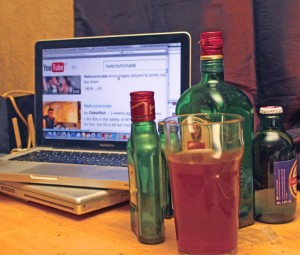
In February, the tragic death of a young man, Carlow student Jonny Byrne, highlighted two issues: the dangers of irresponsible alcohol consumption and the peer pressure culture of online social media.
While it can’t be directly confirmed as the cause of his death, he died after taking part in the social media game known as neck nominations or #NekNomination. The idea behind the dangerous craze is to consume, or neck, a large volume of alcohol in a short amount of time before nominating a friend to do likewise. Most examples feature the nominee quickly consuming a pint of spirits but some have opted for liquids as deadly as WD40 and, in some cases, even their own urine.
Nominees are often challenged to top the feat of those who selected them, leading to increasingly risky stunts as the game progresses.
Videos of nominees performing their challenges are posted on social networking sites like Facebook and Twitter. Apart from the obvious health risk, creating an online persona of this nature can seriously hinder your prospects in life, as employers now often look into online profiles when assessing job applicants.
Over the past decade, thanks to the popularity of reality TV shows and the growth of the internet, the idea has developed in western culture that anyone can become famous, regardless of whether they possess any skill or talent. For every genuinely talented artist to emerge through sites like YouTube, there are thousands who seek fame, or notoriety, through performing attention-seeking and all too often dangerous stunts.
In the past, fame was a by-product of talent, but in today’s world of bad Korean rappers and Jackass, talent is non-essential, all that matters is that people notice you, whether it’s for the right or wrong reasons.
Maybe it’s due to our macho Viking genes, but in Northern Europe the ability to consume large amounts of alcohol has long been a barometer for one’s social standing. A teenager can gain respect among his peers for merely being able to “hold his drink” better than his friends.
Neck Nomination videos overwhelmingly feature participants from the UK, Ireland, Australia and the Scandinavian countries, all long established drinking cultures. You’ll struggle to find too many Italians or Spaniards indulging in the craze. Yet countries like Germany and Austria, whose inhabitants consume a much larger volume of alcohol per capita, refrain from treating alcohol consumption as a game.
Perhaps our stigmatisation of alcohol in this part of the world creates a desire among young people to binge drink as an act of rebellion? In Germany, most young people have their first taste of alcohol in their early teens, a beer or two under their parents supervision, while in Ireland it’s more likely to be a two-litre of cider in a field, followed by a packet of Tic Tacs to fool Mammy and Daddy.
Expecting young people to remain abstinent is arguably unrealistic so the key is to ensure they drink responsibly, within healthy limits and, most importantly, on their own terms, rather than those imposed upon them by their peers.
By Eric Hillis

